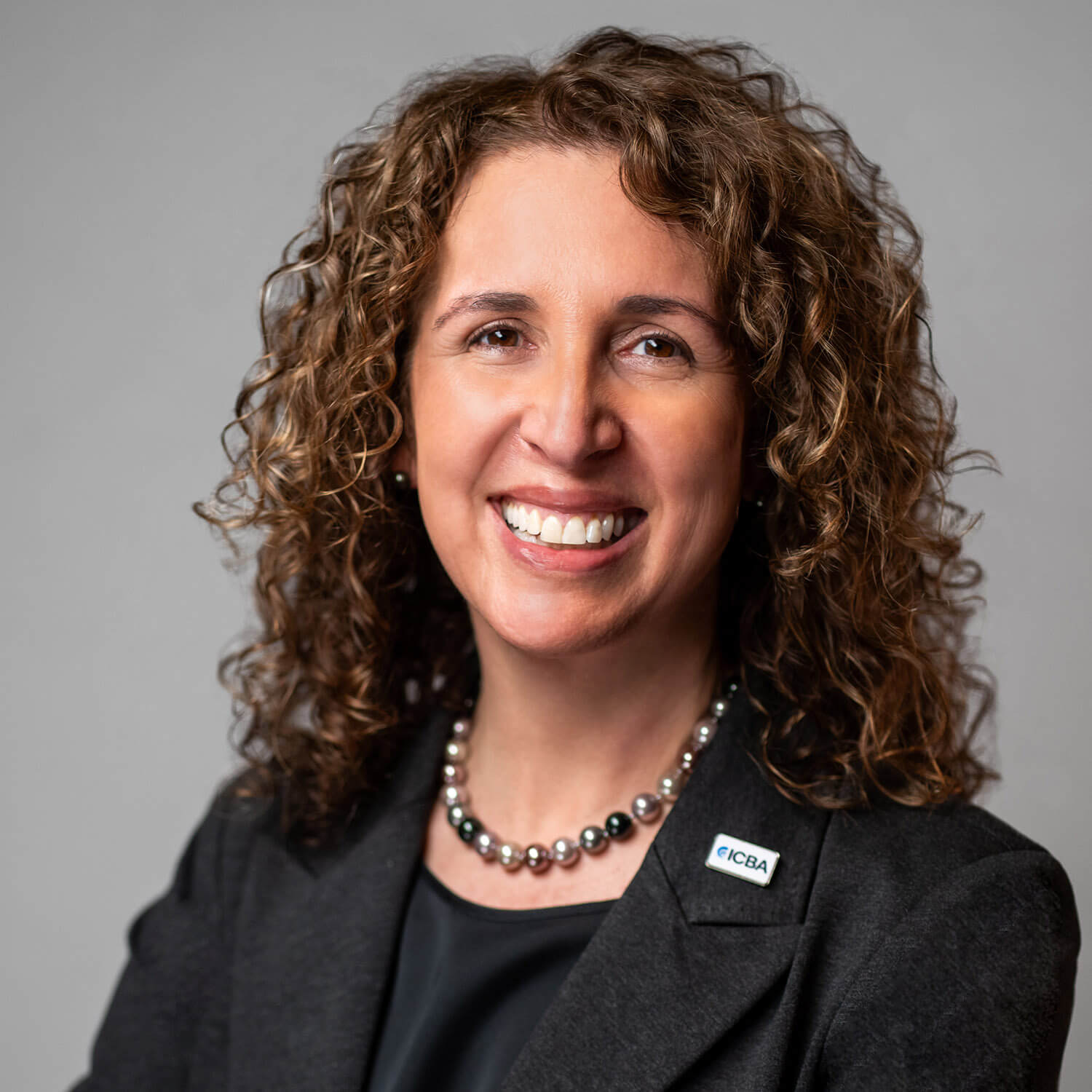At Halfway Point of 2025, ICBA Marks Significant Advocacy Successes
June 30, 2025
The first six months of 2025 have flown by, but ICBA and community bankers have already made substantial progress on our advocacy goals.
On the heels of our recent Capital Summit, in which hundreds of community bankers traveled to Washington to meet with policymakers, it is worth pausing to reflect on our successes as well as the many advocacy priorities we continue to advance under our ambitious “Repair, Reform, and Thrive” plan.
Starting the year with success
“Repair, Reform, and Thrive” focuses on regulatory and legislative changes that will fix broken regulations, unleash the economic power of community banks, and fuel the future of our industry — and we’re off to a strong start.
Let’s begin with the regulatory agencies. Already in 2025:
Michelle Bowman—the first member of the Federal Reserve Board to fill the ICBA-advocated community bank seat created by Congress—has been confirmed to fill one of the agency’s highest positions as the agency’s vice chair for supervision.
The Consumer Financial Protection Bureau delayed compliance of its 1071 small-business reporting rule in response to pending litigation pursued by ICBA and announced plans to commence a new rulemaking, while Congress continues working to address the 1071 rule’s underlying statute.
The CFPB filed a motion for summary judgment to vacate its 1033 rule on consumer data security and privacy, acknowledging the rule is unlawful.
President Trump signed an ICBA-advocated resolution to overturn the CFPB’s final rule on limiting overdraft services and preclude the agency from issuing a substantially similar rule in the future.
The FDIC rescinded ICBA-opposed proposed rules on brokered deposits, corporate governance, and incentive compensation.
The prudential agencies retracted ICBA-opposed rules on climate risk, and the Securities and Exchange Commission withdrew its climate risk disclosure rule.
The banking agencies announced they intend to withdraw their 2023 interagency Community Reinvestment Act final rule amid pending litigation initiated by ICBA and other trade groups.
Treasury Secretary Scott Bessent publicly supported community banks and committed to the continued independence of the nation’s prudential banking regulators and dual banking system.
What these wins mean for community banks
Collectively, these successes will have a significant positive impact on community bank operations.
Bowman’s confirmation marks a fresh approach to regulation and supervision at the Fed that more clearly distinguishes community banks from the largest institutions.
Suspending the 1071 data-reporting requirements will allow community banks to continue tailoring loans to meet the unique needs of local businesses, without putting their privacy at risk.
Vacating the 1033 rule will require the CFPB to address ICBA concerns related to enforcement of data security standards on third parties and ensuring banks may charge a fee for enabling third-party access to their customers’ data.
Overturning the CFPB’s overdraft rule will avoid a negative ripple effect on customers and businesses that rely on overdraft services.
The agencies’ withdrawal of excessive regulatory requirements will prevent regulators from imposing unprecedented costs on community banks, restricting community bank liquidity, establishing sweeping new requirements for community bank boards, advancing a politically motivated climate agenda within the banking system, and applying CRA standards that fail to adequately differentiate community banks from too-big-to-fail entities.
Progress in Congress
Amid swift pro-community bank changes at the banking regulators, Congress has already taken up and advanced numerous ICBA-advocated policies after kicking off the year with hearings on “Making Community Banking Great Again” and community bank small-business priorities.
ICBA-advocated bills to bar credit reporting agencies from selling “trigger leads” when consumers apply for a residential mortgage have passed the House and Senate, leaving Congress to address minor differences in the bills before sending a final version to President Trump to be signed into law.
Further, ICBA tax proposals designed to support market growth and competition have advanced in Congress via the “One Big, Beautiful Bill” legislative package. The House-passed version of the bill would increase the Section 199A deduction to support Subchapter S institutions, make permanent lower individual rates as well as higher estate tax and alternative minimum tax exemptions, and institute a key ACRE Act tax exemption for agriculture and ranch real estate loans. While ICBA continues to review the Senate version, it includes similar pro-community bank provisions.
Meanwhile, the House Financial Services Committee has advanced ICBA-advocated bills to:
Ease regulatory and capital burdens on de novo banks.
Bolster independent reviews of regulatory exams.
Tailor rules for less-risky institutions, including via a short-form call report.
Raise the asset threshold to qualify as a Small Bank Holding Company from $3 billion to $25 billion.
Establish a Treasury Financial Agent program enabling partnerships between minority depository institutions, rural community banks, and other financial institutions.
And we’ve also successfully opposed harmful legislation. Community bankers have heeded ICBA’s calls for grassroots outreach and blocked efforts to advance misguided credit card routing policies and credit card rate caps via pending stablecoin legislation, and we remain engaged with lawmakers to prevent these policies from rearing their heads again.
Much work left to be done
While we have squeezed in years of pro-growth reforms into just six months of policymaking, we still have our work cut out for us in the nation’s capital to consolidate these successes.
For instance, we continue working to:
Secure new co-sponsors for the ACRE Act rural lending bill and to expand on ACRE policies included in advancing tax legislation.
Address check fraud following an ICBA-backed executive order directing Treasury to transition from paper checks to electronic payments and the launch of an ICBA-supported interagency effort to mitigate the risk of payments fraud.
Expand on the progress we’ve made in raising attention among policymakers and the public of the inequities of the credit union tax exemption, with our efforts continuing to gain momentum following our call for policymakers to end the federal tax exemption on credit unions over $1 billion.
Revise the deposit insurance framework so it is appropriately tiered and requires the largest too-big-to-fail institutions to pay a systemic risk premium based on the unique risk they pose to the Deposit Insurance Fund.
Ongoing advocacy remains essential
In addition to these priorities, there are many other policy efforts that we will continue to navigate in the weeks and months ahead.
ICBA continues:
Engaging with lawmakers in the debate over bipartisan legislation to establish a regulatory framework for payment stablecoins, which has yielded positive changes, including to provisions on Federal Reserve master account access and permissible issuer activities.
Encouraging efforts to protect the payments system by preventing nonbanks and institutions with novel charters from accessing Fed master accounts.
Working to ensure the community banking perspective is fully represented at the federal regulators, especially with multiple positions vacant at banking agency boards.
Supporting legislation to replace single-director governance of the CFPB with a five-member commission that has at least one member with community banking experience, which would ensure the prudential regulators actively participate in consumer protection rule-writing while promoting long-term independence from the kind of political interference that has generated excessive regulatory burden on community banks.
Supporting the independence of each federal bank supervisor and advocating for agency boards to be fully staffed.
The road ahead
We have already seen a packed and historic year of policymaking — and we’re only halfway through. To achieve comprehensive reforms that will help community banks meet the needs of local communities, we must continue to engage in the kind of passionate grassroots advocacy we saw during our Capital Summit.
Community bankers can continue reaching out directly to their members of Congress via the grassroots alerts on agenda items such as trigger leads, the ACRE Act, and the 1071 repeal available on ICBA’s Be Heard action center.
Thank you for all you have done to advance our advocacy goals so far this year. By staying fully engaged at this opportune moment, we can continue to succeed in our nation’s capital.


